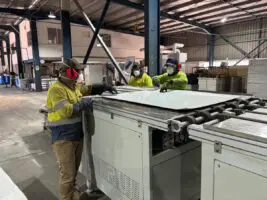Britain’s former top climate envoy has delivered a scathing review of the climate outlook of the fossil fuel industry, in general, and of oil giant Shell, in particular, whose global warming strategy he described as narcissistic, paranoid, and psychopathic in an open letter to the Dutch company’s CEO, Ben Van Beurden.
John Ashton, who served as Special Representative for Climate Change at the UK Foreign and Commonwealth Office (FCO) from 2006 to 2012, delivered the withering missive last week, in response to a speech by Van Beurden that called on his peers to be “less aloof” and “more assertive” on climate change.
But Ashton, who is the founding CEO of Third Generation Environmentalism (E3G), said the Shell boss’s speech was characterised by a cognitive dissonance that said more about the state of mind of the fossil fuel industry than the external conditions that prompted the Shell CEO to speak out.

He said that while oil giants like Shell accepted the “moral obligation” to respond to climate change, it was not considered to be a threat to the industry’s march of progress, which was expected to continue indefinitely.
“It is in truth not your fault that climate change is a hard problem,” Ashton wrote. “Though your industry must bear some responsibility for our failure so far to face it, that is not exclusively your fault either.
“But the choices of your generation of CEOs will be decisive, not only for you as corporations but for the eventual success or failure of our response to climate change.
“That is why you will be held relentlessly to account for those choices; why what you said last month invites forensic scrutiny.”
Ashton’s long and extraordinary letter is well worth reading in its entirety, but we’ve excerpted some of the best bits below, in case you need convincing…
“As we stride forward, a golden thread of growth links the size of the economy, demand for energy, and demand for oil and gas. This should continue indefinitely. Yours will remain “an industry that truly powers economies”, as “the world’s energy needs will underpin the use of fossil fuels for decades to come”.
“You do not, it appears, see climate change as a threat to the steady march. But you fear we might be overzealous. Excessive concern for the climate might lead us to break the golden thread by constraining the combustion of your products.”
“Your response is that we should ease off on climate. We can have a transition but it cannot transform. The aim, in any meaningful timeframe, should not be an energy system that is carbon neutral nor even low carbon.
Instead we must settle for “lower-carbon”, whatever that means, to allow us the “higher energy” that “makes the difference between poverty and prosperity”.”
“That is the story of your mask: a manifesto for the oil and gas status quo, justified by the unsupported claim that the economic and moral cost of departing from it would exceed the benefit in climate change avoided.
Beneath the mask is the face. Its story is encoded in language and tone, and it does not match the mask.
You reject “stereotypes that fail to see the benefits our industry brings to the world”. But you resort freely to stereotypes yourself, to attack those who want more ambition.
…And you accuse them of wanting “a sudden death of fossil fuels”. No phrase in your speech is more revealing. Nobody is asking for this and if they were they would be wasting their time. But the Freudian intensity of your complaint flashes from the text like a bolt of lightning.”
“…Narcissus gazed into the pool and was dazzled by his own reflection.Climate change is a mirror in which we will all come to see the best and the worst of ourselves. In that mirror you seem to see the energy system you have done so much to build and to find it so intoxicating that you cannot contemplate the need now to build a different one.
There is a touch of narcissism in the story of your face.
The paranoiac fears conspiracies that do not exist. You fear a non-existent conspiracy to bring about your sudden death.
There is a touch of paranoia in the story of your face.
The psychopath displays inflated self-appraisal, lack of empathy, and a tendency to squash those who block the way.”
“There is no feel for politics in the Shell Scenarios. That didn’t matter when politics were linear but it does now.
Non-linear politics will welcome new voices. Cities. Communities. Young people. Women. Consumers. Policy takers will become policy shapers.
Their voices will act like a ratchet, driving up ambition on climate.”
“Is this industry still as inspiring to your younger colleagues as it was when you entered it?
Everybody except the real psychopath wants to feel part of the common good. Your company is full of good people. But good people can make bad choices in an institution clinging to a bad idea.”
“Your own position is unenviable.
A gap has opened between wealth (which is high carbon) and value (which is low carbon). Non-linear politics is the response of the people, your customers, to that gap. For a while the gap was narrow enough to straddle. But no longer.
You cannot choose wealth and value. You cannot choose to transform and to struggle against transformation. You cannot choose high carbon and low carbon.
Now you must pick a side and accept the consequences.
It’s an agonizing choice. Either way, the costs will be huge. Either way, you will be rolling the dice. Nothing in your experience prepares you for this moment.”
“You could accept squarely that your E.On moment has come, that the days of yesterday’s business model are numbered, that the challenge now is to manage its decline and build alongside it a new business fit for today, albeit that this is harder for an oil and gas company than it is for a utility.”
“I do not know what the new business model looks like. You won’t begin to know yourselves until you accept that as an instrument of the common good the old one is already dead.
But I do know what the world needs to see if it is to accept your company as part of the solution and no longer part of problem.
Stop frustrating ambition.
Talk to us about how you will play your part in a 2C transition.
Tell us the inspirational story of that transition, backed by your knowledge and experience. The electrification of vehicles and heating; the decarbonization of electricity; new frontiers in efficiency. A new golden age of energy.
And don’t tell us through crocodile tears that this will all take a long time. Tell us what you will do to hasten it, and what you need from government to do it faster.
Come clean on your 2C carbon risk, and get out of investments that would increase it.
Stop pretending that gas is part of the answer to climate change, rather than a necessary stage in a transition to be kept as short as possible. Stop pretending that gas will always crowd out coal rather than renewables, that it won’t blur the political focus we need on efficiency.
Urge your peers to turn their backs on new fracking around the world, as you wisely have in the UK. It’s a high carbon sugar rush and a recipe for political grief. Look at the news from Algeria.
Stop grumbling about renewables. Unlock the opportunities they offer.
Manage a retreat from the carbon frontiers, especially the Arctic. Keep it in the ground.
Press the accelerator on CCS. Use your balance sheet to lever governments into a deal on costs.”






